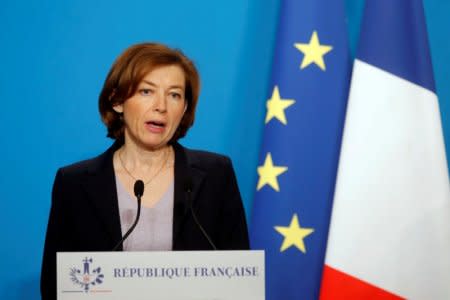Outside EU, France to launch crisis force with Britain, others

Thomson Reuters
By Robin Emmott
LUXEMBOURG (Reuters) - France will launch a military force with other countries including Britain outside the framework of the European Union on Monday, as Paris tries to keep London close to European defenses after Brexit.
After months of negotiations with Germany, which France also wants at the center of the force, the so-called European Intervention Initiative aims to bring together a coalition of willing militaries ready to react to crises near Europe's borders without NATO or the United States.
France's Defence Minister Florence Parly, who will hold a ceremony in Luxembourg at around 1330 CET (1130 GMT), told Le Figaro newspaper on Sunday that France, Germany, Belgium, Britain, Denmark, the Netherlands, Estonia, Spain and Portugal would sign a letter of intent.
"European defense needs a common strategic culture," she said. There EU diplomats confirmed the plans on Monday.
French President Emmanuel Macron proposed the idea in a speech last September, initially facing scepticism because the European Union in December also agreed a landmark defense pact that aims to develop forces and weapons together.
EU defense ministers will agree on Monday the rules of that pact, known as Permanent Structured Cooperation (PESCO), which will be backed by a new multi-billion euro defense fund from 2021, but that will not include Britain because it is leaving the European Union at the end of March next year.
France now sees itself at the center of evolving defense structures after Britain's EU departure, including the EU defense pact, with a bigger role for Spain, and Macron's intervention force that involves Britain, Europe's biggest military along with France.
Britain's role in the force appears to have helped overcome differences between Germany, which has a historical resistance to military missions using force, and France, which wants quicker reaction to crises such as in Mali in 2012, where Paris intervened to stop Islamist militants taking over.
Berlin wanted Macron's force within PESCO, which includes all EU countries except for Britain, Malta and Denmark. France insisted it be outside the more deliberate PESCO structures that are long term, focused on developing weapons and other gear.
Despite its EU departure, Britain is seeking a security treaty with the EU by 2019, eager to retain access to EU databases, weapons contracts and share intelligence, and many EU countries support the idea.
Separately on Monday, Spain is also set to be awarded the right to take over Britain's command of an EU maritime mission that combats Somali pirates next year, after Brexit. [nL8N1TO1VG]
(Additional reporting by John Irish in Paris, Editing by William Maclean)
See Also:

 Yahoo News
Yahoo News 
